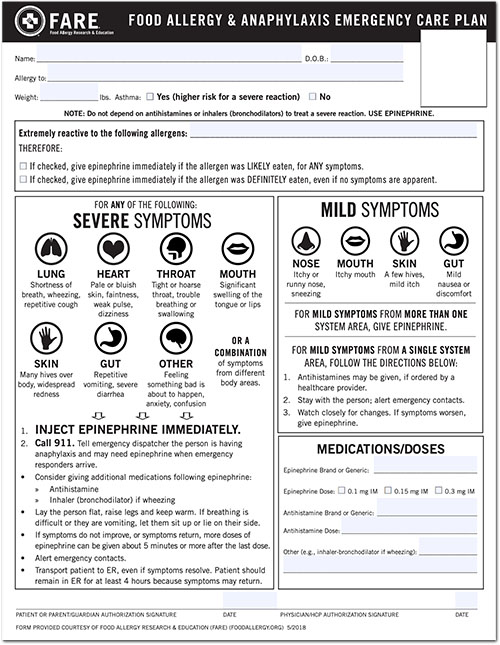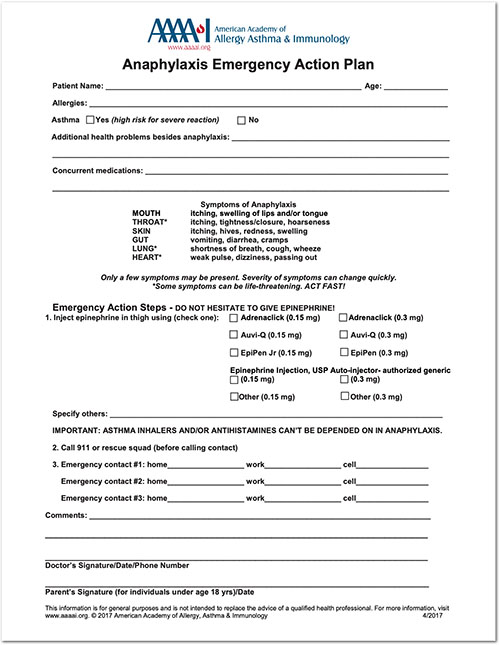Rumors regarding the recent anaphylactic death of a young girl at school have been circulating claiming the epinephrine that could have saved her life was locked away, presumably in the school nurse’s office.
It’s important to understand that epinephrine is the only drug that can halt and reverse the progression of anaphylaxis, a life-threatening reaction to a food, medicine, insect venom, or environmental substance. The sooner it is administered with the onset of anaphylaxis, the better the outcome. Conversely, delaying administration of the drug can prove catastrophic.
We can’t speak to unsubstantiated claims, but we do know many children are not permitted to self-carry epinephrine at school. Instead, parents provide epinephrine auto-injectors for their children to the school nurse or administrator who presumably will retrieve and administer them when necessary.
There are a number of questions regarding how this scenario is implemented:
- Will the administration of epinephrine be delayed if it is stored far from where the child is located, wasting precious minutes?
- Will a nurse or staffer with access to the drug be available at all times when the child is onsite?
- What if the nurse unexpectedly calls out sick for the day or is forced to leave early?
- Who else is trained to recognize the signs of anaphylaxis and administer epinephrine and will they know where the drug is stored and will they have access?
As with any process, the more complex it is, the greater the opportunity for delay or mishap.
We advocate for children to self-carry when possible because it ensures their epinephrine is always close at hand, but we understand there may be circumstances when that is not possible. So how does a parent ensure their child will be administered epinephrine in a timely fashion when anaphylaxis occurs?
It all starts with the child’s emergency action plan and diligent follow-up.
Every child that has been prescribed epinephrine should have an emergency action plan in place at the school. The plan details precisely the circumstances when epinephrine — and possibly other drugs — should be administered and how to follow up.
Here are three popular templates from well-respected organizations you can choose from together with the doctor:
Food Allergy & Anaphylaxis Emergency Care Plan
by Food Allergy Research and Education (FARE)
Allergy Anaphylaxis and Emergency Plan
by American Academy of Pediatrics (AAP)
Anaphylaxis Emergency Action Plan
by American Academy of Allergy, Asthma and Immunology (AAAAI)
The template of choice should be filled out by you and your child’s doctor and both should sign it. Then submit the plan to the school administration and school nurse, and check that it will be readily accessible in case of emergency.
It is imperative that you personally meet with all staff responsible for your child — including the nurse, teachers, cafeteria monitors, et al — and go over the plan with each in detail to ensure they all understand what will be expected of them in an emergency.
If your child self-carries, an addendum to the plan should indicate where they carry their epinephrine, be it on their person, in a backpack, etc.
If your child will not self-carry, an addendum to the plan should indicate where the epinephrine is stored, who has access to it, and who is trained to administer it.
Follow up with the administration by asking the bolded questions above to ensure there will be sufficient coverage of trained individuals with access to epinephrine whenever your child is at school. Insist that you be notified whenever staffing deviates from the norm, such as when the school nurse or homeroom teacher is unavailable.
It’s up to you, the parent, to be comfortable and satisfied with the responses you receive. If not, don’t hesitate to escalate to the principal, superintendent, or board of education.
In a time of anaphylactic emergency, there’s no time to waste. Understand how the school will handle the emergency process and don’t be afraid to assert yourself on behalf of your child if you are not satisfied.









